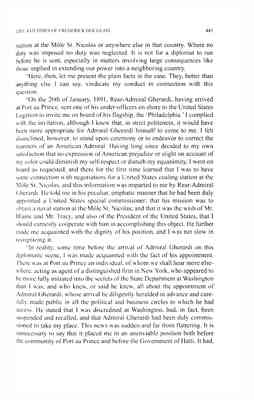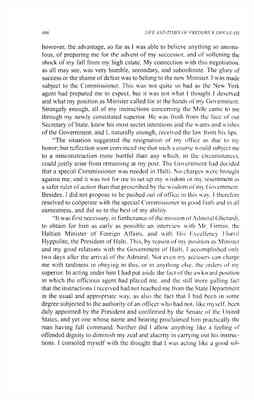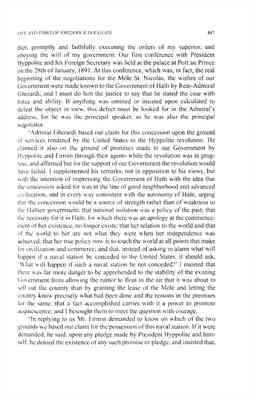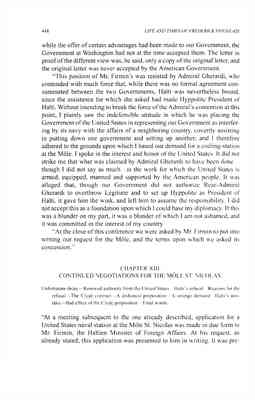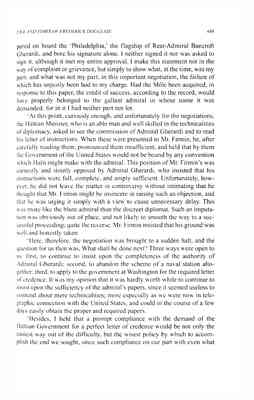Pages
71
LIFE AND TIMES OF FREDERICK DOUGLASS 445
station at the Môle St. Nicolas or anywhere else in that country. Where no duty was imposed no duty was neglected. It is not for a diplomat to run before he is sent, especially in matters involving large consequences like those implied in extending our power into a neighboring country.
"Here, then, let me present the plain facts in the case. They, better than anything else I can say, vindicate my conduct in connection with this question.
"On the 26th of January, 1891, Rear-Admiral Gherardi, having arrived at Port au Prince, sent one of his under-officers on shore to the United States Legation to invite me on board of his flagship, the 'Philadelphia.' I complied with the invitation, although I knew that, in strict politeness, it would have been more appropriate for Admiral Gherardi himself to come to me. I felt disinclined, however, to stand upon ceremony or to endeavor to correct the manners of an American Admiral. Having long since decided to my own satisfaction that no expression of American prejudice or slight on account of my color could diminish my self-respect or disturb my equanimity, I went on board as requested, and there for the first time learned that I was to have sume connection with negotiations for a United States coaling station at the Môle St. Nicolas, and this information was imparted to me by Rear-Admiral Gherardi. He told me in his peculiar, emphatic manner that he had been duly appointed a United States special commissioner; that his mission was to obtain a naval station at the Môle St. Nicolas; and that it was the wish of Mr. Blaine and Mr. Tracy, and also of the President of the United States, that I should earnestly coöperate with him in accomplishing this object. He further made me acquainted with the dignity of his position, and I was not slow in recognizing it.
"In reality. some time before the arrival of Admiral Gherardi on this diplomatic scene. I was made acquainted with the fact of his appointment. There was at Port au Prince an individual, of whom we shall hear more elsewhere, acting as agent of a distinguished firm in New York, who appeared to be more fully initiated into the secrets of the State Department at Washington than I was, and who knew, or said he knew, all about the appointment of Admiral Gherardi, whose arrival he diligently heralded in advance and carefully made public in all the political and business circles to which he had access. He stated that I was discredited at Washington, had, in fact, been suspended and recalled, and that Admiral Gherardi had been duly commissioned to take my place. This news was sudden and far from flattering. It is unnecessary to say that it placed me in an unenviable position both before the community of Port au Prince and before the Government of Haïti. It had,
72
446 LIFE AND TIMES OF FREDERICK DOUGLASS
however, the advantage, so far as I was able to believe anything so anomalous, of preparing me for the advent of my successor, and of softening the shock of my fall from my high estate. My connection with this negotiation, as all may see, was very humble, secondary, and subordinate. The glory of success or the shame of defeat was to belong to the new Minister. I was made subject to the Commissioner. This was not quite so bad as the New York agent had prepared me to expect, but it was not what I thought I deserved and what my position as Minister called for at the hands of my Government. Strangely enough, all of my instructions concerning the Môle came to me through my newly constituted superior. He was fresh from the face of our Secretary of State, knew his most secret intentions and the wants and wishes of the Government, and I naturally enough, received the law from his lips.
"The situation suggested the resignation of my office as due to my honor; but reflection soon convinced me that such a course would subject me to a misconstruction more hurtful than any which, in the circumstances, could justly arise from remaining at my post. The Government had decided that a special Commissioner was needed in Haïti. No charges were brought against me, and it was not for me to set up my wisdom or my resentment as a safer ruler of action than that prescribed by the wisdom of my Government. Besides, I did not propose to be pushed out of office in this way. I therefore resolved to cooperate with the special Commissioner in good faith and in all earnestness, and did so to the best of my ability.
"It was first necessary, in furtherance of the mission of Admiral Gherardi, to obtain for him as early as possible an interview with Mr. Firmin, the Haïti Minister of Foreign Affairs, and with His Excellency Florvil Hyppolite, the President of Haïti. This, by reason of my position as Minister and my good relations with the Government of Haïti, I accomplished only two days after the arrival of the Admiral. Not even my accusers can charge me with tardiness in obeying in this, or in anything else, the orders of my superior. In acting under him I had put aside the fact of the awkward position in which the officious agent had placed me, and the still more galling fact that the instructions I received had not reached me from the State Department in the usual and appropriate way, as also the fact that I had been in some degree subjected to the authority of an officer who had not, like myself, been duly appointed by the President and confirmed by the Senate of the United States, and yet one whose name and bearing proclaimed him practically the man having full command. Neither did I allow anything like a feeling of offended dignity to diminish my zeal and alacrity in carrying out his instructions. I consoled myself with the thought that I was acting like a good sol-
73
LIFE AND TIMES OF FREDERICK DOUGLASS 447
dier, promptly and faithfully executing the orders of my superior, and obeying the will of my government. Our first conference with President Hyppolite and his Foreign Secretary was held at the palace at Port au Prince on the 28th of January, 1891. At this conference, which was, in fact, the real beginning of the negotiations for the Môle St. Nicolas, the wishes of our Government were made known to the Government of Haïti by Rear-Admiral Gherardi; and I must do him the justice to say that he stated the case with force and ability. If anything was omitted or insisted upon calculated to defeat the object in view, this defect must be looked for in the Admiral's address, for he was the principal speaker, as he was also the principal negotiator.
"Admiral Gherardi based our claim for this concession upon the ground of services rendered by the United States to the Hyppolite revolution. He claimed it also on the ground of promises made to our Government by Hyppolite and Firmin through their agents while the revolution was in progress, and affirmed but for the support of our Government the revolution would have failed. I supplemented his remarks, not in opposition to his views, but with the intention of impressing the Go,ernment of Haïti with the idea that the concession asked for was in the line of good neighborhood and advanced civilization, and in every way consistent with the autonomy of Haïti, urging that the concession would be a source of strength rather than of weakness to the Haïti government; that national isolation was a policy of the past; that the necessity for it in Haïti, for which there was an apology at the commencement of her existence, no longer exists; that her relation to the world and that of the world to her are not what they were when her independence was achieved that her true policy now is to touch the world at all points that make for civilization and commerce; and that, instead of asking in alarm what will happen if a naval station be conceded to the United States, it should ask, what will happen if such a naval station be not conceded? I insisted that there was far more danger to be apprehended to the stability of the existing Government from allowing the rumor to float in the air that it was about to sell out the country than by granting the lease of the Môle and letting the country know precisely what had been done and the reasons in the premises for the same; that a fact accomplished carries with it a power to promote acquiescence; and I besought them to meet the question with courage.
"In replying to us Mr. Firmin demanded to know on which of the two grounds we based our claim for the possession of this naval station. If it were demanded, he said, upon any pledge made by President Hyppolite and himself, he denied the existence of any such promise or pledge, and insisted that
74
448 LIFE AND TIMES OF FREDERICK DOUGLASS
while the offer of certain advantages had been made to our Government, the Government at Washington had not at the time accepted them. The letter in proof of the different view was, he said, only a copy of the original letter, and the original letter was never accepted by the American Government.
"This position of Mr. Firmin's was resisted by Admiral Gherardi, who contended with much force that, while there was no formal agreement consummated between the two Governments, Haïti was nevertheless bound, since the assistance for which she asked had made Hyppolite President of Haïti. Without intending to break the force of the Admiral's contention at this point, I plainly saw the indefensible attitude in which he was placing the Government of the United States in representing our Government as interfering by its navy with the affairs of a neighboring country, covertly assisting in putting down one government and setting up another; and I therefore adhered to the grounds upon which I based our demand for a coaling-station at the Môle. I spoke in the interest and honor of the United States. It did not strike me that what was claimed by Admiral Gherardi to haw been done– though I did not say as much– is the work for which the United States is armed, equipped, manned and supported by the American people. It was alleged that, though our Government did not authorize Rear-Admiral Gherardi to overthrow Légitime and to set up Hyppolite as President of Haïti, it gave him the wink, and left him to assume the responsibility. I did not accept this as a foundation upon which I could base my diplomacy. If this was a blunder on my part, it was a blunder of which I am not ashamed, and it was committed in the interest of my country.
"At the close of this conference we were asked by Mr. Firmin to put into writing our request for the Mole, and the terms upon which we asked its concession."
CHAPTER XIII. CONTINUED NEGOTIATIONS FOR THE MÔLE ST. NICOLAS Unfortunate delay– Renewed authority from the United States– Haïti's refusal– Reasons for the refusal– The Clyde contract– A dishonest proposition– A strange demand– Haïti's mistake– Bad effect of the Clyde proposition– Final words.
"At a meeting subsequent to the one already described. application for a United States naval station at the Môle St. Nicolas was made in due form to Mr. Firmin, the Haïtien Minister of Foreign Affairs. At his request, as already stated, this application was presented to him in writing. It was pre-
75
LIFE AND TIMES OF FREDERICK DOUGLASS 449
pared on board the 'Philadelphia,' the flagship of Rear-Admiral Bancroft Gherardi, and bore his signature alone. I neither signed it nor was asked to sign it, although it met my entire approval. I make this statement not in the way of complaint or grievance, but simply to show what, at the time, was my part, and what was not my part, in this important negotiation, the failure of which has unjustly been laid to my charge. Had the Môle been acquired, in resronse to this paper, the credit of success, according to the record, would have properly belonged to the gallant admiral in whose name it was demanded; for in it I had neither part nor lot.
"At this point, curiously enough, and unfortunately for the negotiations, the Haïtian Minister, who is an able man and well skilled in the technicalities of diplomacy, asked to see the commission of Admiral Gherardi and to read his letter of instructions. When these were presented to Mr. Firmin, he, after carefully reading them, pronounced them insufficient, and held that by them the Government of the United States would not be bound by any convention which Haïti might make with the admiral. This position of Mr. Firmin's was earnestly and stoutly opposed by Admiral Gherardi, who insisted that his instructions were full, complete, and amply sufficient. Unfortunately, however, he did not leave the matter in controversy without intimating that he thought that Mr. Firmin might be insincere in raising such an objection, and that he was urging it simply with a view to cause unnecessary delay. This as more like the blunt admiral than the discreet diplomat. Such an imputation was obviously out of place, and not likely to smooth the way to a successful proceeding; quite the reverse. Mr. Firmin insisted that his ground was well and honestly taken.
"Here, therefore, the negotiation was brought to a sudden halt, and the question for us then was, What shall he done next? Three ways were open to us: first, to continue to insist upon the completeness of the authority of Admiral Gherardi; second, to abandon the scheme of a naval station altogether; third, to apply to the government at Washington for the required letter of credence. It was my opinion that it was hardly worth while to continue to insist upon the sufficiency of the admiral's papers, since it seemed useless to contend about mere technicalities; more especially as we were now in telegraphic connection with the United States, and could in the course of a few days easily obtain the proper and required papers.
"'Besides, I held that a prompt compliance with the demand of the Haïtian Government for a perfect letter of credence would be not only the easiest way out of the difficulty, but the wisest policy by which to accomplish the end we sought, since such compliance on our part with even what
